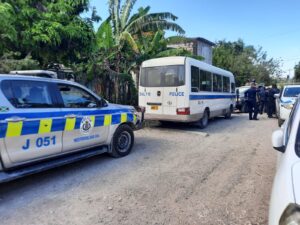
Witness Protection Programme may need additional funds
WITH the level of cooperation from witnesses and some of them wishing to flee the island upon testifying against criminals, Minister of National Security Dr Horace Chang says the budget for the State’s Witness Protection Programme may need to be increased.
Witness protection is one of several measures used by the State to shield individuals involved in the criminal justice process, who find themselves at risk of serious personal harm as a result. In some extreme cases, the risk to a witness is so great that they may need to be relocated and their identity changed.
“It’s well run, it is an extensive programme. We may have to increase our budget, because of some people who want to go overseas. But the system itself, without any apology, we run a very good programme,” Dr Chang told the Jamaica Observer in a recent interview.
Dr Chang’s defence of the Witness Protection Programme is one point noted in chapter two of Jamaica’s National Security Policy document, under the subhead, ‘Threats Relating to Crime’. In referring to the programme, the document states: “No participant has ever been lost, but there still remains a lack of confidence in the programme as witnesses, albeit outside of the programme, have been intimidated and have met untimely deaths.”
Speaking with the Observer, Dr Chang insisted that the “real challenge is not the programme itself, but the people going into the programme”.
“Jamaicans don’t like going into the Witness Protection Programme, especially those associated with gangs. The gangs all have connections nationally, but a number of them [witnesses] feel they are strong enough to operate in the community, which sometimes means they are going back to their ways in a different way — that is the bigger challenge,” Dr Chang stated.
“Once they come into the programme, we have been very successful in managing [the situation]. We don’t need to change the system, what we might [need] to do is increase [the] budget, especially with the anti-gang legislation where we are getting people coming [in] now,” he said, in reference to the police, in recent months, having made a number of arrests of key gang interests, several of whom have also been killed in confrontations with the security forces.
Quizzed as to whether these developments have seen more people taking refuge under the programme, Dr Chang said: “I can’t speak to numbers”, but “the witness against gangs usually have to be offered some level of security and the process of getting them there is working well”.
He, in the meantime, noted that there might be a need to make adjustments on the legislative side, to deal with another type of witness.
“The one area we may need some legal change is when they are convicted already or in the system; the system still has a problem dealing with those individuals. So someone who is convicted but provides critical information, that poses a challenge how to deal with them. We may have to look at some legal changes to allow for individuals who have been convicted to be treated in a particular way. In fact, the whole question of plea-bargaining has to be examined by the Ministry of Justice,” Dr Chang pointed out.
He said discussions are ongoing with the justice ministry to examine proposals for the treatment of those individuals.
He, however, maintained that the programme itself “is doing well”, but “needs additional resources”.
The Ministry of National Security in the 2020/21 Estimates of Expenditure presented by the Government in February was allocated $78 billion for recurrent expenditure and $15.95 billion on the capital side. It also included appropriations-in-aid of just over $592 million. Appropriations-in-aid means any revenue that a department collects in the ordinary course of business, which has been approved by Parliament to be used by the department.
Provision was made for activities that support the costs associated with the Witness Protection Programme.






















